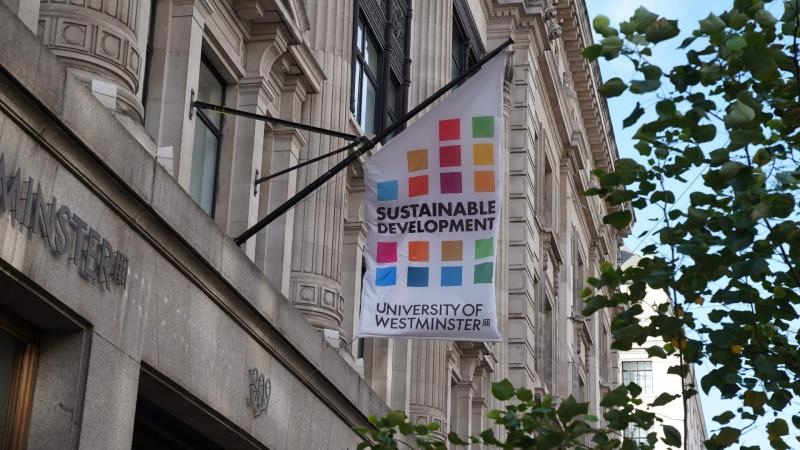The University of Westminster has published its Sustainable Development Goals Report 2024-25, which highlights the University’s continued efforts to embed the United Nations Sustainable Development Goals (SDGs) across teaching, research, operations and community engagement.

The 17 SDGs were created by the United Nations in 2015 to provide achievable aspirations to guide people and organisations on how to create a more sustainable future. Westminster adopted these SDGs in 2019, embedding them into teaching, research and operations, while using the Goals to frame the University’s strategic decisions to support its commitment to being progressive, compassionate and responsible. In doing this, Westminster has been recognised as one of the top 13% out of over 2,300 universities globally and named as a global sustainability frontrunner in the 2025 Times Higher Education Impact Rankings. The report highlights the ways in which the University has worked to achieve each of these Goals.
Since 2024, Westminster has prioritised the integration of Education for Sustainable Development in core curriculum across its entire Foundation and Undergraduate course offer, ensuring that all students gain exposure to sustainability concepts and challenges and feel confident to lead in sustainability no matter their discipline. Education for Sustainable Development (ESD) is the seventh target under SDG 4: Quality Education, and Westminster is committed to ESD with a comprehensive action plan for core, elective and extra- curricula, as well as for colleague support and engaging with the wider sector.
Through the University’s new suite of Community Organising modules, students worked alongside Citizens UK to champion social justice causes and fight towards SDG 1: No Poverty. To do this they led a Living Wage campaign, staging a major assembly at Regent Street Cinema to advocate for fair pay and community action. The project connected classroom learning with tangible civic change, empowering students to use their voices for local impact.

Living Wage Campaign at the Regent Street Cinema
During the year the University also expanded renewable energy generation with new solar PV installations at its Marylebone and Harrow campuses. Together, these systems now generate over 640,000 kWh annually, cutting carbon emissions and meeting a significant portion of the University’s energy needs.
Revived in 2024-25, Sustainability Week brought together colleagues, students and partners for workshops, exhibitions and talks celebrating sustainable innovation. The launch of the inaugural SDG Prize recognised exceptional student work aligned with the Goals, from sustainable architecture concepts to inclusive technology design, showcasing how the next generation is driving real-world impact through their studies.
The University has taken a multi-faceted approach to tackling food poverty, recognising that access to nutritious food is a vital dimension of social equity and wellbeing. Through its Cavendish Living Lab, the University secured £40,000 from the Greener Futures Fund to run interactive food-sustainability workshops in six local secondary schools, engaging around 780 young people and embedding learning from food production to circular economy and waste management.

The Cavendish Living Lab
Westminster also engaged actively with SDG 2: Zero Hunger through teaching, research and key initiatives. The University hosted the World Public Health Nutrition Congress which provided a forum to discuss local, national and global nutrition and health issues and explore new research on potential solutions to the hunger crisis. Over 600 delegates from 66 countries attended, including experts from the fields of nutrition, health, human rights, agriculture, trade, climate change and governance.
Along with this Global Public Health Nutrition MSc students produced a documentary to facilitate discussions on food insecurity by incorporating lived-experience voices from the UK abroad, raising awareness that food poverty is not just a global issue but very much a local one. The Westminster’s Community Conversations film was showcased at a launch event which featured a screening of the film and a series of insightful talks promoting the right to food and nutrition from Westminster colleagues, activists, councillors and MPs.
The University also hosted the annual London Student Sustainability Conference 2025, bringing together over 200 attendees across London higher-education institutions and featuring more than 55 student-led interdisciplinary sustainability projects. Students played an active role in organising the conference, ranging from communications and logistics to workshops on topics such as air-pollution and textile upcycling, underlining how partnerships, student leadership and peer learning are central to advancing the SDGs.
Morgan Lirette, Sustainability Development Advisor, said: “Westminster's commitment to the SDGs has always been bold and confident. That being said, with each year comes a new depth as we not only continue to respond to SDGs in our activities and outputs, but we also do more of it together, consciously in partnership. The SDGs truly connect us as one Westminster community, captured by the annual SDG Report.”
Find out more about how the University of Westminster is taking action towards a more sustainable future from its Sustainable Development Goals report 2024-2025.


